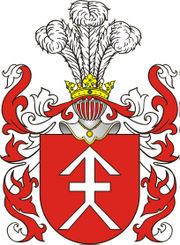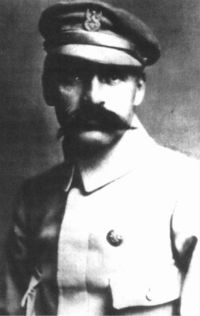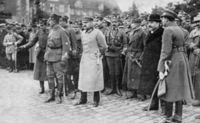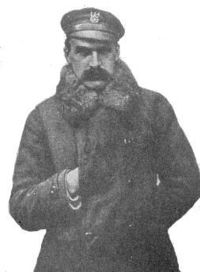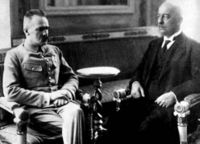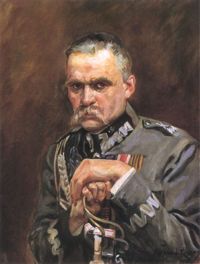Józef Piłsudski
2007 Schools Wikipedia Selection. Related subjects: Historical figures
| Józef Klemens Piłsudski | ||
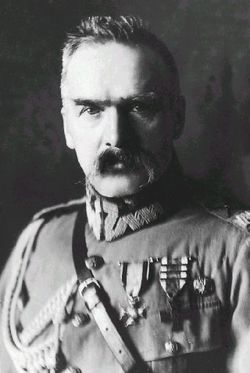 |
||
| Office | Chief of State, Marshal of Poland | |
|---|---|---|
| Term of office | from November 14, 1918 until December 9, 1922 |
|
| Profession | Statesman | |
| Political party | none (see Sanacja for details), formerly PPS | |
| Spouse | Maria Piłsudska Aleksandra Piłsudska |
|
| Date of birth | December 5, 1867 | |
| Place of birth | Zułów, in today's Lithuania | |
| Date of death | May 12, 1935 | |
| Place of death | Warsaw, Poland | |
Józef Klemens Piłsudski ( ['juzεf piw'sutski] , December 5, 1867 – May 12, 1935) was a Polish revolutionary and statesman, Field Marshal, first Chief of State (1918–1922) and dictator (1926–1935), of the Second Polish Republic, as well as the leader of its armed forces. From the middle of the First World War, until his death, Piłsudski was the major influence in the foreign policy and government of Poland, and an important figure in European politics. He is considered to be largely responsible for Poland regaining its independence, one hundred and twenty three years after the partitions of Poland.
Piłsudski was a supporter of the cause of Polish independence from his youth, and in his early political life was an influential member—and later, leader—of the Polish Socialist Party. He considered the Russian Empire to be the most formidable obstacle to Polish independence, and thus worked with Austria-Hungary and Germany to ensure its defeat in the First World War. Later, he withdrew his support from the Central Powers as it became more beneficial for the Polish cause to work with the Triple Entente. During the ensuing Polish-Soviet War, he commanded the 1920 Kiev Offensive and the Battle of Warsaw. From 1918 (the year Poland regained independence) until 1921, he was the Chief of State ( Naczelnik Państwa).
Later, as the Polish government became dominated by his political opponents from endecja he withdrew from politics, but returned to power after the May 1926 coup d'état, becoming the de facto dictator of Poland. From then on, he primarily concentrated on military and foreign affairs, until his death in 1935. To this day, he is held in high regard by most of the Polish public.
Biography
Early life
Piłsudski was born in the Russian Empire in the village of Zułów (today Zalavas, Lithuania) to a Polish szlachta family of Lithuanian ancestry. He attended school in Wilno (today Vilnius, Lithuania), but was not especially diligent in his school studies. As a boy, he was introduced by his mother, Maria Bilewiczówna, to Polish literature and history, which was suppressed by the Russian authorities. His father, also named Józef, fought in the 1863 January Uprising against the Russian occupation of Poland. His families had strong patriotic inclinations, and Piłsudski was much troubled by the Russification programs of the Russian government. For example, Piłsudski was compelled to attend Eastern Orthodox Church services, which he found deeply distasteful.
In 1885, he began studying medicine at the University of Kharkov (modern Kharkiv, Ukraine), where he became involved with Narodnaya Vola revolutionary movement, part of the Russian Narodniki. In 1886 he was suspended for participation in student demonstrations. He was also rejected by the University of Dorpat (now Tartu), Estonia, whose authorities had been informed of his political affiliation. On 22 March 1887, he was arrested by the Tsarist authorities on a false charge of plotting to assassinate Tsar Alexander III with Vilnian socialists. In fact, Piłsudski's main connection to that plan was the involvement in it of his elder brother, Bronisław Piłsudski. Bronisław had been friends with friends of Vladimir Lenin's brother, Aleksandr Ulyanov, and was sentenced to hard labor ( katorga) in eastern Siberia, for fifteen years.
Piłsudski was sentenced to a punishment milder then his brother: exiled for five years to eastern Siberia, first to Kirinsk on the river Lena, and later to Tunka. As an exilee, Piłsudski was allowed to work in occupation of his chosing, although for being a Polish noble local officials decided he was not entitled to receive the 10- ruble pension most other exilees received. During his voyage in a prisoner's convoy to Siberia, he was held for few weeks in a prison in Irkutsk. There, he took part in a 'revolt' of prisoners: after one of prisoners insulted a guard and refused to aplogize, he and others political prisoners were brutally beaten down by the prison guards for their defiance; Piłsudski lost two of his teeth there and took part in a subsequent hunger strike until the authorities reinstated the priviliges of political prisoners they suspended after the 'revolt'. For his involvement in this event, he was, in 1888, sentenced to six months imprisonment; he had to spend the first night of his incarceration in a 40-degree below zero Siberian cold; this led to an ilness that nearly killed him then and to various health problem that would plague him throughout his life. During the years of exile to Siberia, Piłsudski meet many Sybiraks, among them Bronisław Szwarce, who almost became one of the leaders of the January Uprising..
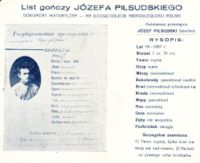
Arrest warrant of Józef Piłsudski
Historical document - for the tenth anniversary of Polish independence
State criminal
JÓZEF PIŁSUDSKI nobleman
DESCRIPTION:
Years 19 - 1887
Height 1 m, 75 cm
Face clear
Eyes grey
Hair dark blond
Sideburns light blond rare
Eye brows dark blond coming together
Beard dark blond
Mustaches light blond
Nose normal
Mouth normal
Teeth not all
Chin round
Distinctive marks:
1) clear face, only his eyebrows are growing together over his nose
2) a wart on the edge of the right ear
Piłsudski, after his release in 1892, joined the Lithuanian branch of the Polish Socialist Party (PPS) in 1893, forming the Lithuanian branch of PPS.Initially, he sided with the Socialists' more radical wing, but despite the ostensible internationalism of the Socialist movement, he always remained a Polish nationalist. As a chief editor he began publishing a bibuła socialist newspaper, Robotnik (The Worker) from 1894; he would be one of his chief writers. From 1895, he became one of the PPS leaders, where he took the stance that doctrinal issues are of minor importance and socialist ideology should be merged with nationalist one, as that combination gave the biggest chance to regain Polish independence. In 1899, during his time as an underground organizer, Piłsudski married a fellow socialist organizer, Maria Juszkiewiczowa z Koplewskich, but his marriage started to come apart when several years later Piłsudski started an affair with a younger female Socialist, Aleksandra Zahorska. Maria died in 1921 and Piłsudski married Aleksandra in October of that year. They had two daughters (Wanda and Jadwiga), but this marriage also had its own troubles.
In February 1900, after the Russian authorities found Robotnik's underground printing press in Łódź, Piłsudski was imprisoned at the Warsaw Citadel but, after feigning mental illness in May 1901, he managed to escape from a mental hospital at St. Petersburg with the help of Władysław Mazurkiewicz and others, fleeing to Galicia, then a region of Austria-Hungary.
On the outbreak of the Russo-Japanese War (1904–1905), in summer 1904, Piłsudski travelled to Tokyo, Japan, where he unsuccessfully attempted to obtain that country's assistance for an uprising in Poland. He offered to supply Japan with intelligence in support of her war with Russia and proposed a plan to create a legion from Poles, conscripted into the Russian army, who had been captured by Japan. He also suggested a "Promethean" project directed at liberating ethnic communities occupied by the Russian Empire — a goal that he later continued to pursue and that would be partly achieved only in 1991 with the disintegration of the Soviet Union. Interestingly, in the same time period, another notable Pole, Roman Dmowski, also travelled to Japan, where he argued against Piłsudski plan trying to discourage Japanese government from supporting the Polish revolution at this time, an insurrection which Dmowski felt would be doomed to failure. A Polish patriot himself, Dmowski would remain Piłsudski's political arch-enemy until the end of his life (he actually outlived Piłsudski). In the end, Japanese offered only a limited assistance to Piłsudski; he received Japan's help in purchasing weapons and ammunition for the PPS and the combat organisation associated with the party, but the Japanese declined the legion proposal; it was much less than he hoped for.
In fall 1904, Piłsudski founded an armed organization, the " Bojówki" ("combat teams"), to create an armed resistance movement aimed against the Russian authorities. PPS organized an increasing number of demonstrations (mostly in Warsaw); on October 28, 1904 Russian Cossack cavalry trampled one of the demonstrations, in revenge, on November 13 the 'bojówki' opened fire on the Russian police and military during a new demonstration. First concentrating on fighting the spies and informants, in March 1905 'bojówki' started using bombs to assassinate selected members of Russian police.
During the Russian Revolution of 1905, Piłsudski played a leading role in events in Congress Poland In early 1905, he ordered the PPS to launch a general strike there. It involved some 400,000 workers, and lasted two months before it was broken by the Russian authorities. In June 1905, Piłsudski ordered an uprising in Łódź. During the " June Days", as the Łódź uprising came to be known, armed clashes broke out between gunmen loyal to Piłsudski's PPS and those loyal to Roman Dmowski's National Democratic Party (Endeks). On December 22, 1905, Piłsudski called for all Polish workers to rise up; his call was widely ignored. Unlike the Endeks, Piłsudski ordered the PPS to boycott the elections to the First Duma. The decision to boycott the elections and to try to win Polish independence through uprisings caused much tension within the PPS, and, in November 1906, a faction of the party split off in protest of Piłsudski's leadership. The Piłsudski's faction was known as Old Faction or the Revolution Faction (Starzy, Frakcja Rewolucyjna), while their opponents were known as the Young Faction, Moderate Faction or the Left Wing (Młodzi, Frakcja Umiarkowana, Lewica). The Youngs sympathized with the Social Democracy of the Kingdom of Poland and Lithuania and believed that the priority should be cooperation with Russian revolutionaries in toppling the tsardom and creating a socialist utopia first, and negotiation for independence would be easier later. Piłsudski with his supporters from the revolutionary faction of the PPS, continued to plan a revolution against tsarist Russia which would secure Polish independence first. By 1909 Piłsudski's faction would be the majority faction of PPS again, and Piłsudski would remain one of the most important leaders of PPS until the First World War.
Piłsudski anticipated a coming European war and the need to organize the nucleus of a future Polish army that could help win Poland's independence from the three empires that had partitioned her out of political existence in the late 18th century. In 1906, Piłsudski, with the connivance and support of the Austrian authorities, founded a military school in Kraków for the training of Bojówki. In 1906 alone, the 800-strong Bojówki, operating in five-man units in Congress Poland, killed 336 Russian officials; the number of casualties declined in the coming years; while the number of its members increased (to around 2,000 in 1908). 'Bojówki' also assaulted Russian transports of money leaving Polish territories. In April/September 1908, the Bojówki robbed a Russian mail train carrying tax revenues from Warsaw to St. Petersburg. Piłsudski, who took part in the raid at Bezdany near Vilna 1908, used those funds to aid his secret military organization. The loot from that single raid (200,812 rubles--or approximately $100,000) was a virtual fortune in contemporary Eastern Europe and equaled the amount 'Bojówki' looted in the two previous years.
In 1908, Piłsudski transformed the "Combat Teams" to " Związek Walki Czynnej" (Association for Active Struggle), headed by three of his associates, Władysław Sikorski, Marian Kukiel, and Kazimierz Sosnkowski. One of the main purposes of ZWC was to train officers and NCOs for the future Polish army. In 1910 two legal paramilitary organisations were created in the Austrian partitional zone (one in Lwów and the second in Cracow), to conduct training and lectures in military science. In 1912, Piłsudski became the Commander-in-Chief of Związek Strzelecki (under the codename 'Mieczysław'). With the permission of Austrian authorities, Piłsudski founded a series of "sporting clubs," followed by a riflemen's association that served as cover for training a Polish military force that grew by 1914 to 12,000 men. In 1914, Piłsudski declared that "only the sword now carries any weight in the balance for the destiny of a nation".
World War I
At a meeting in Paris in 1914, Piłsudski presciently declared that in the imminent war, for Poland to regain her independence, Russia must be beaten by the Central Powers (the Austro-Hungarian and German Empires), and the latter powers must in their turn be beaten by France, Britain and the United States. At the same time, Roman Dmowski, leader of another faction of the Polish nationalist movement, believed the best way to achieve a unified and independent Poland, was to support the Triple Entente against the Triple Alliance.
At the outbreak of the World War I he set out from Kraków at the head of a well-trained group of units, with which he entered the Russian partitioned Poland and took control of a border strip evacuated by the Russians near Kielce, but failed to encourage a national uprising. Next he made an alliance with Austria, and officially established the Polish Legion, taking personal command of its First Brigade, which he would lead successfully into several victorious battles. However, he secretly informed the British government in the fall of 1914, that his Legions would never fight against France and Britain--only against Russia. Within the Legions, Piłsudski decreed that personnel were to be addressed by the French-Revolution-inspired "Citizen," and he himself was referred to as "the Commandant" ("Komendant"). Piłsudski commanded extreme respect and loyalty of his men that would remain for years to come. The Polish Legion fought with distinction against Russia at the side of the Central Powers until 1917. Soon after the formation of the Legions, and also in 1914, Piłsudski also formed another secter organization, the Polish Military Organisation (Polska Organizacja Wojskowa), which served as a precursor to the Polish intelligence and was designed to carry out espionage and sabotage missions.
On November 5, 1916, the Central Powers proclaimed the "independence" of Poland, hoping that as a result Polish troops would be sent to the eastern front against Russia, relieving German forces to bolster the Western front. Piłsudski agreed to serve in the " Kingdom of Poland" created by the Central Powers, but insisted that his men not be treated as "German colonial troops" and only be used to fight Russia. Piłsudski, then serving as minister of war in the newly created Polish Regency government, also opposed the demand that the Polish units swear loyalty to Germany and Austria. In the aftermath of the Russian Revolution and worsening situation of the Central Powers, Piłsudski increasingly took an uncompromising stance. In the aftermath of the Oath crisis, in July 1917, where he forbade Polish soldiers to take an oath of loyalty to the Central Powers, he was arrested and imprisoned at Magdeburg; the Polish units were then disbanded and soldiers incorporated into the Austro-Hungarian army, and the Polish Military Organizations started attacking German targets. The arrest vastly increased Piłsudski's reputation among Poles, and many in the Polish society began to see him as the most consequent and determined of the Polish leaders, willing to fight against all partitioners.
On November 8, 1918, Piłsudski and his comrade, Colonel Kazimierz Sosnkowski, were released from Magdeburg and soon — like Vladimir Lenin before them — placed on a private train, bound for their national capital, as increasingly desperate Germans were hoping Piłsudski would gather forces friendly to them.
On November 11, in Warsaw, Piłsudski was appointed Commander in Chief of the Polish forces by the Regency Council and was entrusted with the mission of creating a national government in the newly independent country; on that day, he proclaimed an independent Polish state (that day would become the Polish independence day). He negotiated the retreat of the German garrison from Warsaw and other German troops from the Ober-Ost (Eastern front) and on 14 November 1918, he was asked to provisionally supervise the running of the country, and, on 22 November, he officially received the title of Provisional Chief of State ( Naczelnik Państwa), of renascent Poland from the new government of Jędrzej Moraczewski.
The Provisional People's Government of the Republic of Poland, formed in Lublin, bowed to Piłsudski, who set about forming a new coalition government. It was predominantly Socialist and immediately introduced many reforms long proclaimed as necessary by the Polish Socialist Party (e.g. the 8-hour day, free school education, vote for women). This was absolutely necessary to avoid major unrest. However, Piłsudski believed that as head of state he must be above political parties, and the day after his arrival in Warsaw, he met with old colleagues from underground days, who addressed him socialist-style as " Comrade" (" Towarzysz") and asked for support of their revolutionary policies; Piłsudski rebuked them with his famous remark that "I took the red tram of socialism to the stop named Independence, but that's where I got off". He declined to support any one party and did not form any political organization of his own. He also set about organizing a Polish army out of Polish veterans of the German, Russian and Austrian armies.
In the days immediately after the World War I, Piłsudski attempted to build a government in a shattered country. Much of former Russian Poland had been destroyed in the war, and systematic looting by the Germans had reduced the region's wealth by at least 10%. A British diplomat who visited Warsaw in January 1919 reported: "I have nowhere seen anything like the evidences of extreme poverty and wretchedness that meet one's eye at almost every turn". In addition, Piłsudski had to transform the different systems of law, economics, and administration in the former German, Austrian and Russian partitions of Poland into one; there were nine different legal systems, five currencies, 66 types of rail systems (with 165 models of locomotives), and other similar problems, which all had to be urgently consolidated.
Piłsudski drove himself hard, working all day and, on a regimen of tea and chain-smoked cigarettes, all night. He maintained a Spartan lifestyle, eating plain meals alone at an inexpensive restaurant, and became increasingly pale and thin. Though Piłsudski was very popular with much of the Polish public, his reputation as a loner (the result of many years' underground work), of a man who distrusted almost everyone, led to strained relations with other Polish politicians.
The first Polish government and Piłsudski were also distrusted in the West because Piłsudski had cooperated with the Central Powers in 1914-17 and because he had supported the formation of a Socialist government. It was not until January 1919, when the world-famed pianist and composer Ignacy Jan Paderewski became Prime Minister (also Foreign Minister) of a new government, that it was recognized in the West. That still left two separate governments claiming to be the legitimate government of Poland: Piłsudski's in Warsaw, and Roman Dmowski's in Paris. To ensure that Poland had a single government and to avert civil war, Paderewski met with Dmowski and Piłsudski and persuaded them to join forces, with Piłsudski acting as provisional president and supreme commander-in-chief while Dmowski and Paderewski represented Poland at the Paris Peace Conference of 1919.
Piłsudski often clashed with Dmowski, at variance with the latter's vision of the Poles as the dominant nationality in reborn Poland, and irked by Dmowski's attempt to send the Blue Army back to Poland through Danzig, Germany (modern Gdańsk, Poland).
On 20 February 1919, Piłsudski's declared that he would return his powers to the newly elected Polish parliament ( Sejm). However, the Sejm reinstated his office in the Small Constitution. The word Provisional was removed from the title; and Piłsudski would hold that office until 9 December 1922, when Gabriel Narutowicz was elected the first President of Poland.
Polish-Soviet War
Speaking of Poland's future frontiers, Piłsudski said: "All that we can gain in the west depends on the Entente — on the extent to which it may wish to squeeze Germany," while in the east "there are doors that open and close, and it depends on who forces them open and how far".
Piłsudski aspired to create a federation (to be called Międzymorze, "Between-Seas," stretching once again from the Baltic to the Black Sea), of Poland with Lithuania, Belarus and independent Ukraine, somewhat in emulation of the pre-partition Polish-Lithuanian Commonwealth, but with the smaller Poland surrounded by a federation of friendly nations. Piłsudski's plan was, however, to be dashed by the outcome of the Polish-Soviet War of 1919-1921.
In 1919, there was unrest on all Polish borders. Piłsudski viewed the Bolsheviks as less dangerous for Poland than their Russian-civil-war contenders, as the White Russians were not willing to accept Poland's independence, while the Bolsheviks did proclaim the partitions of Poland null and void. As such, by his refusal to join the attack on Lenin's struggling Soviet government, ignoring strong pressure from the Entente Cordiale, Piłsudski had likely saved the Bolshevik government in summer-fall 1919. In the east, Polish forces clashed with Ukrainian forces in the Polish-Ukrainian War, but soon it became apparent that the real enemy of both nations was the Bolsheviks.
In April 1920, Marshal Piłsudski (as his rank had been since that March) signed an alliance with Ukraine's leader, Symon Petliura, to conduct a joint operation against the Russian SFSR. The Polish-Ukrainian alliance treaty, signed on 22 April, had the goal of establishing an independent Ukraine in alliance with Poland. In return, Petliura gave up Ukrainian claims to East Galicia, and was denounced for this by the Ukrainian leaders there. The Polish and Ukrainian armies, under Piłsudski's command, launched a successful offensive against the Russian forces in Ukraine. On May 7, with remarkably little fighting, they captured Kiev.
The Soviets launched their own successful counteroffensive from Belarus and counter-attacked in Ukraine, advancing into Poland in a drive toward Germany in order to encourage the communist movements (like the Communist Party of Germany) struggling to take power. The Soviets confidence soared as Soviet communist theorist Nicholas Bukharin, writer for the newspaper Pravda, wished for the resources to carry the campaign beyond Warsaw "right up to London and Paris". General's Mikhail Tukhachevsky order of the day, 2 July 1920 read: "To the West! Over the corpse of White Poland lies the road to world-wide conflagration. March on Vilno, Minsk, Warsaw!" and "onward to Berlin over the corpse of Poland!".
The National Democracts argued that the string of Bolshevik victories was Piłsudski's fault and demanded his resignation. On 12 August, Piłsudski presented his resignation to the Prime Minister Wincenty Witos, but he refused to accept it. Over the next few weeks Polish risky, unconventional strategy at the Battle of Warsaw (August 1920) managed to halt the Soviet advance.
The Polish plan was developed by Piłsudski and others, like Tadeusz Rozwadowski. Later, some supporters of Piłsudski tried to portray him as the sole inventor of the Polish strategy, while his opponents would try to minimize his role. The plan called for Polish forces to withdraw across the Vistula River and defend the bridgeheads at Warsaw and the Wieprz River, while some 25% of available divisions concentrated to the south for a strategic counter-offensive.
Next Piłsudski's plan required that two armies under General Józef Haller facing Soviet frontal attack on Warsaw from the east, hold their en trenched positions at all costs. At the same time, an army under General Władysław Sikorski was to strike north from behind Warsaw, thus cutting off the Soviet forces attempting to envelope Warsaw from that direction. The most important role, however, was assigned to a relatively small (approximately 20,000-man), newly assembled "Reserve Army" (known also as the "Strike Group" — Grupa Uderzeniowa), commanded personally by Piłsudski, comprising the most determined, battle-hardened Polish units. Their task was to spearhead a lightning northern offensive, from the Vistula- Wieprz River triangle south of Warsaw, through a weak spot identified by Polish intelligence between the Soviet Western and Southwestern Fronts. That offensive would separate the Soviet Western Front from its reserves and disorganize its movements. Eventually, the gap between Sikorski's army and the "Strike Group" would close near the East Prussian border, resulting in the destruction of the encircled Soviet forces.
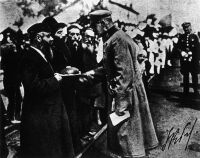
At the time, Piłsudski's plan was strongly criticized, and only the desperate situation of the Polish forces persuaded other army commanders to go along with it. Although based on fairly reliable intelligence, including intercepted Soviet radio communications, the plan was termed "amateurish" by many high-ranking army officers and military experts, who were quick to point out Piłsudski's lack of a formal military education. When a copy of the plan accidentally fell into the Soviets' hands, Tukhachevsky thought it a ruse and disregarded it. Days later, they paid dearly for their mistake, when during the Battle of Warsaw the overconfident Red Army suffered one of its largest defeats in history.
An "Endek" Sejm deputy, Stanisław Stroński, coined the phrase, "Miracle at the Wisła" (Polish: "Cud nad Wisłą"), to underline his disapproval of Piłsudski's "Ukrainian adventure." Stroński's phrase was adopted by some patriotically- or piously-minded Poles praising Piłsudski, unaware of Stroński's ironic intent. The Marshal's Polish detractors also sought to ascribe the winning strategy to General Maxime Weygand of the French military mission to Poland. Later, a junior member of that mission, Charles de Gaulle, would adopt some lessons from the war as well as from Piłsudski's career.
The Treaty of Riga (1921), closing the Polish-Soviet War, which Piłsudski called an act of cowardice, partitioned the Belarus and Ukraine between Poland and Russia. This treaty, and general Lucjan Żeligowski capture of Wilno from the Lithuanians, marked an end to Piłsudski's federalist dream.
Early retirement and return to power
After the Polish constitution adopted in March 1921 ( March Constitution) severely limited the powers of the presidency in the new democratic Second Polish Republic, Piłsudski refused to run for the office of president. On 9 December 1922, he turned over his powers to his friend, the newly elected president, Gabriel Narutowicz. Five days later, after his inauguration, Narutowicz was shot dead by a mentally deranged, right-wing, anti-Semitic painter and art critic, Eligiusz Niewiadomski, who had originally wanted to kill Piłsudski. When a right-wing government subsequently came to power, Piłsudski found it impossible to work with Prime Minister Wincenty Witos, whom he regarded as morally responsible for the incident. In May 1923 Piłsudski disgustedly resigned as chief of the general staff and went into retirement outside Warsaw to his country house at Sulejówek, where he settled down to literary work and political writings, especially a series of books of political and military memoirs.
Meanwhile, the economy of Poland was in shambles. Hyperinflation fueled public dissent and Polish government was unable to find a quick solution to civil unrest, mounting unemployment and economic crisis. Allies and supporters of Piłsudski's repeatedly asked him to return to politics and he begun to create a new powerbase, centered around the former members of the Legions and Polish Military Organizations, as well as some left-wing and intelligencja parties. In 1925, when several Polish governments resigned in short order and the political scene was becoming more and more chaotic, Piłsudski was increasingly critical of the government, giving many interviews, and eventually issued several statements demanding the resignation of the Witos cabinet. When the government now showed signs of stabilization, and the endecja coalition Chjeno-Piast, strongly criticized by Piłsudski, formed a new government, on May 12-14 1926, Piłsudski returned to power in a military coup d'etat (the May Coup), aided by socialist railwaymen whose strike paralysed communications and prevented government reinforcements from reaching Warsaw.
President Stanisław Wojciechowski and Prime Minister Witos stepped down. Piłsudski, however, did not accept the office of president, aware of its limited powers. 215 soldiers and 164 civilians were killed during those events, and over 900 people were wounded (many of them were careless bystanders). Józef Piłsudski's formal offices — apart from two terms as prime minister in 1926-28 and 1930 — were for the most part limited to those of minister of defence and inspector-general of the armed forces. He also held the offices of minister of military affairs and chairman of the council of war.
The period of authoritarian rule
Internal politics
In internal politics, Piłsudski's coup meant in reality the end of parliamentary government in Poland for the next 10 years, as Piłsudski's Sanacja government (1926-1939) — conducted at times by authoritarian means — directed at restoring "moral health" to public life. Piłsudski quickly distanced himself from the most radical of his left-wing supporters, declaring that his coup was to be a "revolution without revolutionary consequences". From 1928 Sanacja was represented by the Bezpartyjny Blok Współpracy z Rządem party. Popular support and elegant rhetoric allowed Piłsudski to maintain his authoritarian powers, which could not be overruled by the president, who in any case had been nominated by the Marshal, nor by Sejm, whose powers were curtailed in constitutional amendments introduced soon after the coup, on 2 August 1926.
One of the main goals for Piłsudski, who was becoming increasingly disillusioned with the democracy, was to transform the parliamentary system into a presidential system. The adoption of a new Polish constitution in April 1935, tailored by Piłsudski's supporters to his specifications — providing for a strong presidency — came too late for Piłsudski to seek that office; but the April Constitution would serve Poland up to the outbreak of World War II and would carry its Government in Exile through to the end of the war and beyond. Nonetheless Piłsudski's reign depended more on his charismatic authority than on rational-legal authority. None of his followers could claim to be his successor and after his death the Sanacja would quickly fracture, with Poland returning to the pre-Piłsudski era of parliamentary political struggles.
Piłsudski's regime marked the much needed stabilization and improvements in the situation of ethnic minorities, which formed almost a third of the population of the Second Republic. Piłsudski replaced endecja's ' ethnic assimilation' with the 'state assimilation' policy: citizens were judged by their loyalty to the state, not by their nationality. The years 1926-1935, and Piłsudski himself, were favourably viewed by many Polish Jews, whose situation improved especially under the cabinet of the Piłsudski-appointed prime minister Kazimierz Bartel. However a combination of various reasons, from the Great Depression to the vicious spiral of terrorist attacks by Organization of Ukrainian Nationalists and government pacifications meant that the situations of minorities of Poland was less than satisfactory, despite Piłsudski's efforts.
From 1926 to 1930, Piłsudski used mostly propaganda tools to weaken the position and influence of the opposition leaders. The culmination of his dictatorial and 'above the law' policies came in 1930 with imprisonment of certain political opponents before the Polish legislative election, 1930, and the establishment of the prison for political prisoners in Bereza Kartuska (today Biaroza) where some prisoners were beaten and brutally mistreated. After the 1930 victory of BBWR Piłsudski left most of the internal matters in the hands of his "colonels", himself concentrating on military and foreign affairs.
In the realm of military, Piłsudski, once a great military strategist responsible for the Miracle at Vistula, had been criticized for concentrating on personnel management, and ignoring development of new plans, strategies or military equipment.
Foreign policy
In foreign policy, Piłsudski, as de Gaulle was later to do in France, sought to maintain his country's independence on the international scene. Ably assisted by his protege, Minister of Foreign Affairs Józef Beck, he sought support for Poland in alliances with western powers — France and Britain — and with friendly, if less powerful, neighbours: Romania and Hungary. A supporter of the Franco-Polish Military Alliance and the Polish-Romanian Alliance (part of the Little Entente), he was nonetheless disappointed by the French policy of appeasement, visible in the such actions as the signing of the Locarno Treaties.Therefore Piłsudski's aim was also to maintain good relations with the USSR and with Germany, and thus Poland signed the non-aggression pacts with both of its powerful neighbours ( Soviet-Polish Non-Aggression Pact of 1932, German-Polish Non-Aggression Pact of 1934). Both treaties were meant to strengthen Poland's position in the eyes of its allies and neighbours. He was acutely aware of the shakiness of the non-aggression pacts, remarking sarcastically: "Having these pacts, we are straddling two stools. This cannot last long. We have to know from which stool we will tumble first and when that will be."
Under his control, Poland had good relations with some of its neighbours (notably Romania, Hungary and Latvia), however relations with Czechoslovakia were strained, and with Lithuania even worse. Relations with Germany and the Soviet Union varied in time, but during Piłsudski's life could, for the most part, be described as neutral.
One of notable Piłsudski's foreign polices, Prometheism, which was designed to reduce the power of Russia, was pursued by Edmund Charaszkiewicz. However, this policy proved to be relatively unsuccessful.
One of the most widely mentioned plans of Piłsudski's foreign policy was his rumored proposal to French about declaring war on Germany after Adolf Hitler came to power in Germany in January 1933. Piłsudski might have sounded out Poland's ally, France, regarding the possibility of joint military action against Germany, which had been openly rearming in violation of the Versailles Treaty. When France declined, Piłsudski was compelled to sign a German-Polish Non-Aggression Pact in January 1934. However, this argument that the German-Polish non-aggression pact had been forced on Piłsudski by French refusal to wage a "preventive war" on Nazi Germany has been disputed by some historians who point out that there is no evidence in either the French or Polish diplomatic archives that such an offer was made. They point out that when in late October 1933 rumours of Polish "preventive war" proposal were reported in Paris, the source of these rumours were the Polish Embassy, which informed French reporters that Poland had proposed a "preventive war" to France and Belgium, but by this time, Poland and Germany were already secretly negotiating the non-aggression pact with Germany. It has been argued that Piłsudski had the Polish Embassy start rumours of a "preventive war" being considered as a way of pressuring the Germans, who were demanding that the Poles abrogate the Franco-Polish alliance of 1921. As it was, the non-aggression pact specifically excluded the Franco-Polish alliance. It has been argued that Piłsudski's reasons for seeking a non-aggression pact with Germany was due to his concerns over the Maginot Line. Up to 1929, French plans in the event of war with Germany called for an French offensive onto the North German plain in conjunction with offensives from Poland and Czechoslovakia. The building of the Maginot Line, which was started in 1929, strongly indicated that henceforward, in the event of war with Germany, the French Army would maintain a strictly defensive position, and that France’s eastern allies were going to be on their own (if true, Piłsudski's successfully predicted the future: this is what in fact happened in the 1939 with the Phony War). Thus, from Piłsudski's viewpoint, in light of France's military plans, a non-aggression pact with Germany was the best option under the circumstances.
Hitler unceasingly suggested a German-Polish alliance against the Soviets, but Piłsudski declined the proposal, instead seeking precious time to prepare for war with Germany or the Soviet Union if it was necessary. Also on numerous occasions, Hitler planned to meet with Piłsudski, and again he was rebuffed.
Death
By 1935, unbeknownst to the public, Piłsudski had for several years been in declining health. He died of liver cancer on May 12, 1935, at the Belvedere Palace in Warsaw. His funeral turned into a national tribute to the man who had probably done most in the military sense to restore Poland's independence. His body was placed in the Leonard's Crypt of the Royal Crypts at Wawel Cathedral, in Kraków, but his heart was interred in his mother's grave at Rossa Cemetery, in Vilnius, where it remains today.
Legacy
On May 13, 1935, in accordance with the last wishes of Józef Piłsudski, Edward Rydz-Śmigły was nominated by the president and the government of Poland to serve in the capacity of the Inspector-General of the Polish Armed Forces and on November 10, 1936 he was elevated to the rank of Marshal of Poland. Rydz was now one of the most powerful people in Poland and was awarded the title of "Second Man in the State after the President". Many saw him Rydz-Śmigły as Piłsudski's successor, however he never became as influential as Piłsudski was. Polish government nonetheless became increasingly authoritarian and conservative, with Śmigły-Rydz faction opposed by the more moderate Ignacy Mościcki, who remained President. After 1938, Rydz-Śmigły reconciled himself with the President, but the ruling clique was henceforth divided into the "President's Men" (or "Castle Group") — most of them civilians, and the "Marshal's Men" (or "Piłsudski's Colonels") who were mostly old companions of Piłsudski and professional officers. After German invasion of Poland in 1939 marked the start of the World War II, some of this political division survived within the Polish government in exile, however after the war relatively little of Piłsudski's thought influenced the politics of the People's Republic of Poland, dominated by the Polish communists de facto satellite state of the Soviet Union.
Nonetheless Piłsudski had given Poland something akin to what Henryk Sienkiewicz's Onufry Zagłoba had mused about: a Polish Oliver Cromwell. As such, the Marshal had inevitably drawn both intense loyalty and intense vilification. During the times of the People's Republic of Poland, Piłsudski was publicly ignored or condemned by the state - which only served to increase his popularity with the nation. After the fall of communism, he become increasingly recognized as a national hero. On the 60th anniversary of his death, on 12 May 1995, the Polish Sejm issued a statement: "Józef Piłsudski will remain in the memory of our nation as the founder of independence and as the victorious leader who fended off a foreign assault that threatened the whole of Europe and its civilisation. Józef Piłsudski served his motherland well, and has entered our history forever."
This declaration was not that different from the words of President of Poland, Ignacy Mościcki, in a speech during Piłsudski's funeral: "He was king of our hearts and ruler of our will. Through half a century of his life’s toil, he took into his possession heart after heart, soul after soul, until he drew the whole of Poland under the purple of his royal spirit [...] He gave Poland freedom, boundaries, power and respect."
One of the most brilliant Polish military commanders of the 20th century, Piłsudski has been the patron of several military units. These have included the 1st Legions Infantry Division, and an armoured train Nr. 51 ("I Marszalek"). Józef Piłsudski Institute of America, a New York research centre and museum of the modern history of Poland, has also been named after him. He is also the patron of Academy of Physical Education in Warsaw. His life has also been shown on television: Marszałek Piłsudski, a tv series, was directed in 2001 by Andrzej Trzos-Rastawiecki.
Names
As a young man, Piłsudski belonged to many underground organizations and used a variety of pseudonyms, including Wiktor, Mieczysław and Ziuk. Later he was often affectionately called Dziadek ("the Grandpa") or Marszałek ("the Marshal"). His ex-soldiers also referred to him as Komendant ("the Commandant").
